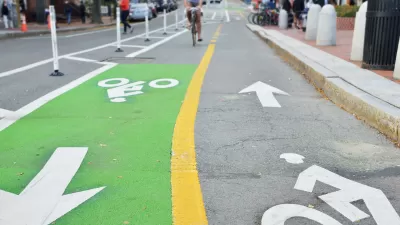Maybe not. But smart growth experts appearing at the APA in Los Angeles say it may be morphing into whatever the "next big thing" is.
"We are truly at the cusp of the next big thing," said presenter Tim Chapin, a planning professor at Florida State. "We are living in a time when planners and economic development are much more together than they have been in, gosh, decades."
Shelley Poticha, head of the Office of Sustainable Communities at the Department of Housing & Urban Development, agreed that economic development is a vital part of the emerging new trend. "We need to turn this around to a place-based ED strategy that is very multi-layered," Poticha said. "Many communities we are working with had economies based on one or two strong sectors and one or both crashed. And so they don't have much to stand on." At the same time, she said, place-based strategies can strengthen downtowns and neighborhoods in a way that reinforces local businesses and allows wealth to stay and circulate in a community rather than leaving town.
They appeared on the first of three panels dealing with smart growth playing off articles in the current issue of the Journal of the American Planning Association.
Thanks to Bill Fulton
FULL STORY: Is The Era of Smart Growth Over?

Maui's Vacation Rental Debate Turns Ugly
Verbal attacks, misinformation campaigns and fistfights plague a high-stakes debate to convert thousands of vacation rentals into long-term housing.

Planetizen Federal Action Tracker
A weekly monitor of how Trump’s orders and actions are impacting planners and planning in America.

In Urban Planning, AI Prompting Could be the New Design Thinking
Creativity has long been key to great urban design. What if we see AI as our new creative partner?

King County Supportive Housing Program Offers Hope for Unhoused Residents
The county is taking a ‘Housing First’ approach that prioritizes getting people into housing, then offering wraparound supportive services.

Researchers Use AI to Get Clearer Picture of US Housing
Analysts are using artificial intelligence to supercharge their research by allowing them to comb through data faster. Though these AI tools can be error prone, they save time and housing researchers are optimistic about the future.

Making Shared Micromobility More Inclusive
Cities and shared mobility system operators can do more to include people with disabilities in planning and operations, per a new report.
Urban Design for Planners 1: Software Tools
This six-course series explores essential urban design concepts using open source software and equips planners with the tools they need to participate fully in the urban design process.
Planning for Universal Design
Learn the tools for implementing Universal Design in planning regulations.
planning NEXT
Appalachian Highlands Housing Partners
Mpact (founded as Rail~Volution)
City of Camden Redevelopment Agency
City of Astoria
City of Portland
City of Laramie





























